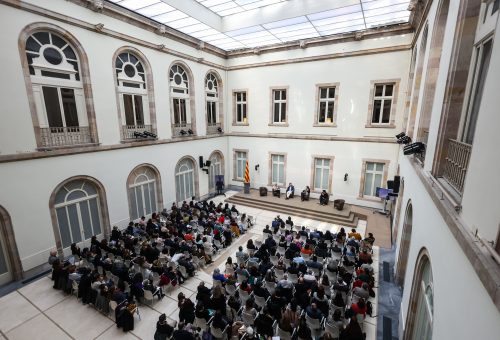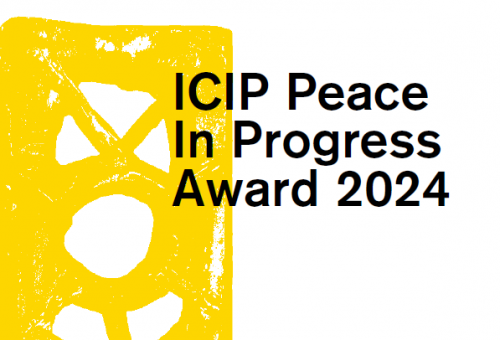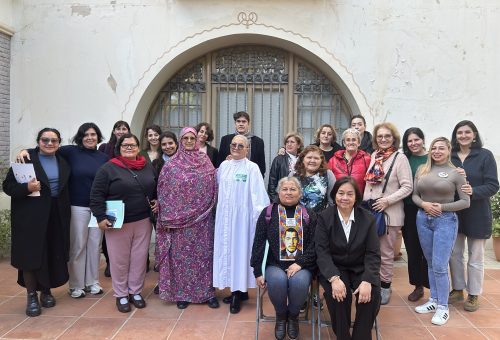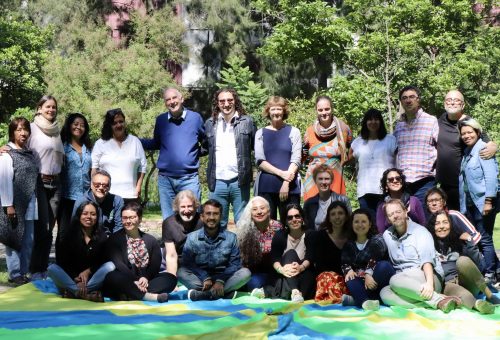ICIP has presented the survey “Public perception of coexistence and security in Catalonia,” based on 1,003 phone interviews, with the aim of providing representative and reliable information about the perception that Catalan society has of the aspects that shape coexistence and security and the main problems and threats related to these issues. The presentation took place at the ICIP Library with the participation of ICIP president Xavier Masllorens; Pablo Aguiar, coordinator of the ICIP program “Peace and Security in Public Policies”; and Ivan Soler, director of the Brandologia market research institute.
The results of the sample show that 70.1% of the Catalan population believes that coexistence in Catalonia is good or very good, with an average score of 7.2 on a scale of 10, and this percentage increases to 85.5% when assessing coexistence in the municipality or neighborhood, with a score of 7.8. Regarding the perception of security, 61.6% of the population believes that security in Catalonia is good or very good, with an average score of 6.7 on a scale of 10, and that percentage also increases, up to 72.4%, when security is assessed in the municipality or neighborhood, with a score of 7.2. In less urban environments both coexistence and security are assessed more positively.
The main problems of coexistence in the municipality/neighborhood are antisocial behavior, according to 45.8% of survey respondents, and cultural differences related to immigration (30.9%). These are followed by other issues, such as crime and drug-related problems (23.5%), insecurity (20.6%), and xenophobia (14.2%). In general, women perceive more coexistence problems than men, especially those related to insecurity. In all cases, however, over half the population considers that these problems are either rare or nonexistent.
The survey also focuses on the causes that can lead to discrimination in the municipality/neighborhood and concludes that 37.6% of the population perceives a lot or quite a lot of discrimination due to ideology, more than for reasons of race or ethnicity (12.7%), religion (9.2%) and sexual orientation (8.1%).
With respect to Catalonia as a whole, among the issues raised in this survey, crime and drug trafficking, along with terrorism, are seen as the main threats to security for 73% of respondents. These are followed by international political instability, (63.6%), cyberattacks (60.4%) and the pro-sovereignty process (42.8%).
Attitudes regarding coexistence and security
In a second part, the survey analyzes the attitudes that citizens have regarding different aspects related to coexistence and security by means of their degree of agreement or disagreement with a total of ten statements. The sample shows that Catalonia is a socially and politically active society, committed to coexistence and tolerance, and that it defends the right to publicly express its opinions. It is worth noting that more than half of Catalans (56.5%) have participated in two or more social or political activities in the last six months, mainly solidarity activities (61.8%), street demonstrations (53.1%) and protests with pots and pans (36.4%).
“The citizenry has been extremely active and it should be noted that the survey was conducted during months that were also extremely active politically and socially,” explained ICIP program technician Pablo Aguiar.
The statement “In a democracy everyone has the right to take part in demonstrations even though sometimes it can have negative effects on my daily routine” received an agreement score of 7.9 out of 10 (67.6% of respondents very much agree), and the statement “Creating campaigns that promote greater tolerance and respect for different opinions helps improve coexistence” obtained a 7.8 (62% of respondents very much agree). The consensus is also high, with a score of 8.2, regarding the statement “A better quality of life and less economic inequality are necessary conditions to improve coexistence” (71.1% of respondents very much agree).
On the other hand, regarding the issue of whether “the presence of symbols, such as flags in the street, worsens coexistence,” the degree of agreement is lower, with an average score of 5.3. In this case there are differences depending on the sense of belonging of the respondents: the percentage of disagreement is higher among people who feel Catalan (54.7%), while those who feel Spanish, or both Spanish and Catalan, are mostly very much in agreement (49%).
The survey also shows that there is a high degree of consensus among the Catalan people in favor of solving problems associated with coexistence and threats to security through dialogue and negotiation, as opposed to the use of coercive measures that entail the use of force.
“Catalan society largely favors resolving conflicts through mediation, and this is a very important finding,” observed ICIP president Xavier Masllorens.
The statement “I prefer to resolve conflicts through mediation rather than with the armed forces” received an agreement score of 8.9 (84.4% very much agree) and this score increases among people with a high level of education, with a score of 9.3.
The degree of agreement decreases regarding statements that refer directly to the army or the security forces. The statement “The presence of military forces represents a threat to my security” received an agreement score of 6.2, and “The presence of armed security forces in the street aggravates coexistence” received a 6. In both statements the degree of agreement is higher among people who feel mainly Catalan and are between 41 and 64 years old.
Regarding the freedom-security balance, the data show that almost half the population (45.2%) is not willing to lose any right or freedom in exchange for greater security. In this case younger people are those who are less willing to lose rights or freedom; this willingness increases with age. Differences are also perceived according to the level of education: people with a low education level are more willing to lose rights or freedom in exchange for more security.
Peace and international security
In the current political context in Catalonia, characterized by the pro-sovereignty process, the survey also focuses on what the contribution to world peace and security should be like in a hypothetically independent Catalonia. Up to 78.1% of the population believes that this contribution should mainly be in the way of conflict prevention, international mediation and civil defense policies, while only 8.5% believes that it should be mainly with an army of its own and 13.5% of respondents do not answer.
The commitment to conflict prevention and mediation policies enjoys greater support among young people between 18 and 24, people who feel mainly Catalan, with a high level of education and who are politically and socially active; in these segments support for mediation exceeds 85%. In the case of low education levels, 14.4% express a preference for the army.
According to the president of ICIP, the high consensus in favor of mediation is “a very relevant fact, which is in line with one of ICIP’s functions: to foster dialogue and the resolution of conflicts through mediation.”
Methodology used
The survey “Public perception of coexistence and security in Catalonia” is based on 1,003 interviews conducted in Catalonia between the end of April and the beginning of May 2018 and distributed throughout the land with proportional allocation, according to data of the Institute of Statistics of Catalonia, dated 1 January 2018. Thus 213 surveys were conducted in the city of Barcelona; 426 surveys were conducted in the metropolitan area of Barcelona (excluding the city of Barcelona proper); and 361, in the rest of Catalonia.
The sample has also been segmented by sex (516 women and 484 men) and by age. The level of studies, which is mostly high, was taken into account in the assessment of the results: 74.8% of respondents have completed the second stage of secondary education and 32.6% of them are university graduates. With respect to national identity, 50.8% stated that they feel only Catalan or more Catalan than Spanish, 38.3% said they feel both Spanish and Catalan, and 5.8% said they feel only Spanish or more Spanish than Catalan.
24.01.2018




